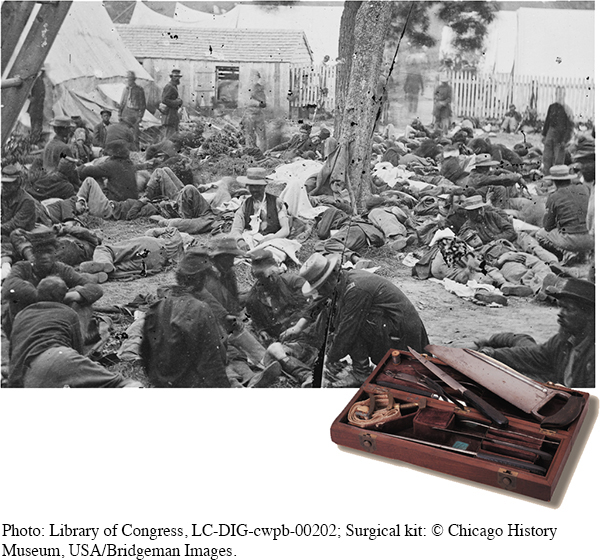The American Promise: Printed Page 434
MAKING HISTORICAL ARGUMENTS
The American Promise: Printed Page 434
Page 434Why Did So Many Soldiers Die?
The American Civil War was the bloodiest conflict in American history (Figure 15.3). Precise numbers are hard to determine, but approximately 750,000 soldiers died. Why were the Civil War totals so horrendous?
This question is almost as old as the war itself, and in answering it historians have traditionally pointed to a variety of explanations: the scale and duration of the fighting; military strategy; battlefield technology; and the backward state of medicine. The sheer size of the armies—
When the war began, Union and Confederate medical departments could not cope with skirmishes, much less large-
Soldiers did not always count speedy transportation to a hospital as a blessing, however. As one Union soldier said, “I had rather risk a battle than the Hospitals.” Field doctors gained a reputation as butchers, but a wounded man’s real enemy was medical ignorance. Physicians had almost no knowledge of the cause and transmission of disease or the benefits of antiseptics. Unaware of basic germ theory, surgeons spread infection almost every time they operated. They wore the same bloody smocks for days and washed their hands and their scalpels and saws in buckets of dirty water. Although surgeons used anesthesia (both ether and chloroform), soldiers often did not survive amputations, not because of the operations but because of the gangrene that inevitably followed. A Union doctor discovered in 1864 that bromine arrested gangrene, but the best that most amputees could hope for was maggots, which ate dead flesh on the stump and thus inhibited the spread of infection. The growing ranks of nurses, including Dorothea Dix and Clara Barton, improved wounded men’s odds and alleviated their suffering. Still, during the Civil War, nearly one of every five wounded rebel soldiers died, and one of every six Yankees. A century later, in Vietnam, only one wounded American soldier in four hundred died.
Soldiers who avoided battlefield wounds and hospital infections still faced sickness. Deadly diseases such as dysentery and typhoid swept through crowded army camps, where latrines were often dangerously close to drinking water, and mosquitoes, flies, and body lice were more than nuisances. Pneumonia and malaria also cut down thousands. Quinine from South America proved an effective treatment for malaria, but by the end of the war the going price was $500 an ounce. Civilian relief agencies promoted hygiene in army camps and made some headway. Nevertheless, disease killed nearly twice as many soldiers as did combat. Many who died of disease were prisoners of war. Approximately 30,000 Northerners died in Confederate prisons, and approximately 26,000 Southerners died in Union prisons.
The American Promise: Printed Page 434
Page 435Recently, historians have probed another explanation for the death toll, turning to soldiers’ cultural attitudes and values to explain why they were willing to die in such great numbers. Some have explored how the nineteenth-


Questions for Analysis
Summarize the Argument: What does the author conclude were the major reasons that so many soldiers died in the Civil War?
Analyze the Evidence: In what ways were Civil War strategists fighting the world’s first “modern” war? In what ways were they still fighting a traditional war? How do these factors account for the number of dead and wounded soldiers?
Consider the Context: Which economy—